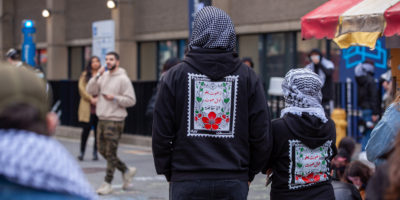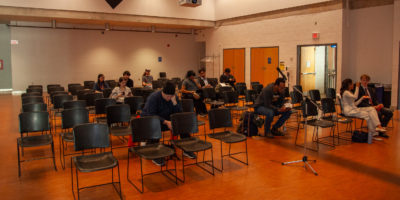By Heidi Lee
A collective of Black, Indigenous and students of colour (BIPOC) and student leaders have organized a day of action to educate the public on the way post-secondary institutions perpetuate anti-Black and anti-Indigenous racism, according to a member from the All Out September 30 (AOS30) strike committee.
The day of action will also commemorate Orange Shirt Day, a national day to remember Indigenous children who were sent to residential schools and to recognize their healing process by dedicating an opening ceremony to it.
Azinwi Kien, who is part of the core planning team for AOS30 and the president of the York Federation of Students (YFS), said it was inevitable that a collective of student leaders in the Greater Toronto Area would form given the fact that they have all been part of conversations surrounding racial justice and anti-racism work in their respective schools.
“I think it is time to strike,” she said. “It’s time for us to hold university administrations and people accountable, it’s time for us to tell our stories publicly, it’s time for us to say enough is enough.”
“[These conversations] are in no way new or started due to the pandemic or due to the killing of Regis Korchinski-Paquet or George Floyd.”
Kien added that the AOS30 strike belongs to an ongoing anti-racism conversation and is designed to focus on post-secondary institutions.
“We shouldn’t wait until things get escalated where somebody has to lose their life or something has to happen that there is no turning back from before changes are implemented,” she said.
“It’s time for us to hold university administrations and people accountable…”
AOS30 has listed nine demands on its social media pages: providing free and accessible education for all; recognizing and implementing Orange Shirt Day in institutions; defunding the police; removing special constables on campus; decent work and wage on campus; more BIPOC teaching staff in faculty; the implementation and prioritization of Indigenous and Black programs; and the implementation of race-based data collection at institutions province-wide.
Notably, the organizers are demanding the immediate removal of the Egerton Ryerson statue, stating that the university’s namesake is “a legacy that is no doubt colonial and racist in nature.”
Kien said the demands listed on AOS30’s social media are just an overall generalized idea of their demands—the campaign will give participants “a better understanding of the experiences that inform these demands” on the day of the strike, which in turn prove their necessity.
On the day of the strike, there will be various webinars that will provide further details on AOS30’s demands. The day will end with a final webinar to address racism in classrooms and an open forum where students, staff and faculty members can speak up and share the racism they have experienced at their institutions.
“Truth and reconciliation cannot begin at Ryerson when a statue glorifying the key architect of the violent residential school system continues to stand on our campus”
The strike is endorsed by both the Continuing Education Students’ Association of Ryerson (CESAR) and the Ryerson Students’ Union (RSU).
In an email to The Eyeopener, CESAR vice-president equity and campaigns Maddy Fast stated that AOS30 “raises demands that we’ve been hearing from Indigenous and Black students at Ryerson.”
She added that students, staff, faculty, alumni and community members have signed petitions calling for the immediate removal of the Egerton Ryerson statue and to be replaced with a tribute to the Indigenous peoples of this land.
On Sept. 2, Ryerson president Mohamed Lachemi announced the appointment of a task force to examine the school’s relationship with the history of Egerton Ryerson and the statue.
Fast said CESAR is urging Lachemi not to delay the “inevitable” removal of the statue.
“Students don’t need another task force to determine what we already know—truth and reconciliation cannot begin at Ryerson [when] a statue glorifying the key architect of the violent residential school system continues to stand on our campus,” she wrote.
CESAR also called for charges to be dropped against Black Lives Matter activists who were arrested after they defaced the statue in July.
At the RSU’s fifth Board of Directors meeting, Board of Governors student representative David Jardine put forward a motion to endorse AOS30. RSU president Ali Yousaf asked if Jardine knew who was organizing the strike campaign, adding that he was unclear about AOS30’s demands and whether the protest would be in-person or remote.
Despite concerns expressed by Yousaf, the motion to endorse AOS30 was passed.
“Our battle is also their battle”
In addition, the University of Toronto Scarborough Students’ Union (SCSU) and the Canadian Federation of Students Ontario (CFSO) endorsed AOS30.
Sarah Abdillahi, president of SCSU, said AOS30’s call for defunding the police and removing special constables on campus happens to coincide with the student union’s demands.
“For SCSU, we are currently developing our anti-Black racism campaign [and] one of the campaign points is to call for the University of Toronto (U of T)—both St. George and Scarborough campuses—to ban the special constable program and redirect that funding to community-led safety alternatives,” she said.
According to Abdillahi, last year, a U of T Mississauga student was handcuffed by campus police while seeking mental-health service. Over 130 professors, faculty members and students signed an open letter demanding an apology from the university.
At Ryerson, the university announced the cancellation of the special constable program in June and in August, president Lachemi announced a Presidential External Expert Panel to examine campus safety and security.
As a Black student leader, Abdillahi said she resonates with many of the demands that other BIPOC students are fighting for. She said when students stand together, their demands are more likely to be heard and taken seriously, which is more effective than advocating for racial justice on their own on their respective campuses.
“That’s why it is important to stand in solidarity with one another, especially with the Indigenous community because this land does not belong to us,” said Abdillahi. “Our battle is also their battle and [this is why] we have to always include Indigenous voices, have them being able to speak on their experiences and give them a platform to speak about the systemic racism that they are also going through.”
Sébastien Lalonde, chairperson for the CFSO, said as the CFSO is mandated to fight for a free and accessible education system through an intersectional lens, AOS30’s list of demands “falls very much in line with what CFSO stands for.”
“When we ran our 2019 lobby week, we included conversations about the Ontario Student Grant promoted in 2016 by the former Liberal government; and how the increase in access to post-secondary education for students [has increased] the amount of Indigenous, low-income and marginalized students who are able to access education,” he said.
Lalonde added that although there is a severe lack of race-based data related to post-secondary education, there is data to show that racialized students have better access to post-secondary education when grants are in place.










Leave a Reply